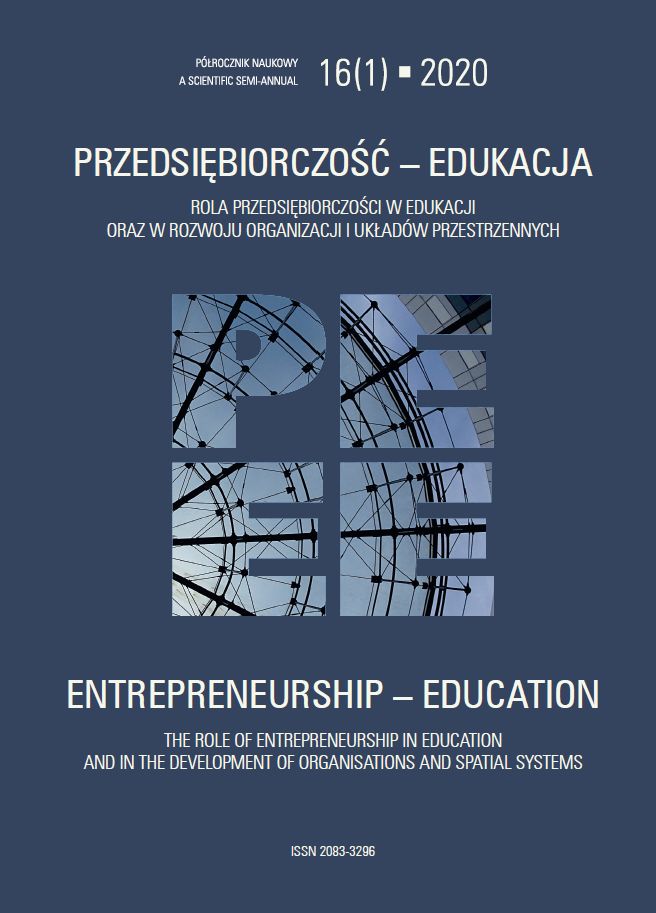Determinants of Entrepreneurial Intention among University Students
DOI:
https://doi.org/10.24917/20833296.161.3Keywords:
entrepreneurship, entrepreneurial attitudes, entrepreneurial intention, university students, own businessAbstract
The purpose of the research presented in this article is to learn about students’ entrepreneurial predispositions and willingness to run a business, the barriers to entrepreneurship and the factors that encourage undertaking business activity. The article is based on the results of own research carried out among university students aged 19-25. The research was carried out among 540 students in Wielkopolska region. Criteria taken into consideration focused on gender and place of residence of respondents. Survey questions concerned entrepreneurial predispositions, available knowledge on starting the business activities, barriers and factors discouraging business undertakings and the forms of supporting entrepreneurship expected by the students. The main, empirical part of the article is based on research carried out by the authors. While the first part reveals students’ characteristics, further parts explore entrepreneurial intentions of academic students, as well as factors and barriers that are relevant for the development of their entrepreneurial attitudes and their training needs in order to run their own business. Research results revealed that readiness to undertake economic activity could be stimulated by many factors. The results of the research also indicate deficiencies in students’ knowledge on how to run their own business.
References
Ajzen, I. (1991). Theory of planned behavior. Organizational Behavior and Human Decision Processes, 50, 179–211.
Athayde, R. (2009). Measuring Enterprise Potential in Young People. Entrepreneurship. Theory and Practice, 1042–2587.
Banerski, G., Gryzik, A., Matusiak, K.B., Marzewska, M., Stawasz, E. (2009). Przedsiębiorczość akademicka. Raport z badania. Warszawa: PARP.
Drucker, P.F. (1998). Praktyka zarządzania. Kraków: Czytelnik – Nowoczesność – Akademia Ekonomiczna w Krakowie.
Harris, M.L., Gibson, S.G. (2008). Examining the entrepreneurial attitudes of US business students. Education + Training, 50(7), 568–581. doi: https://doi.org/10.1108/00400910810909036
Hudson, J.W. (1993). Intellectual Capital. How to build it, Enhance it, Use it. New York: John Wiley&Sons.
Łuczka, T., Rembiasz, M. (2016). Badanie postaw przedsiębiorczych studentów – wybrane aspekty teoretyczne i empiryczne. Horyzonty Wychowania, 15(34), 27–47. doi: https://doi.org/10.17399/HW.2016.153402
Peters, M., Sigl, C., Strobl, A. (2007). Die Einstellung zum Unternehmertum aus Sicht zukünftiger Universitätsabsolventen. Zeitschrift für KMU und Entrepreneurship, 4, 291–308.
Poznańska, K. (2014). Przedsiębiorczość akademicka – cechy i znaczenie w gospodarce światowej i polskiej. W: T. Kraśnicka (red.), Innowacyjność współczesnych organizacji. Kierunki i wyniki badań. Część II. Katowice: Uniwersytet Ekonomiczny w Katowicach, 164–172.
Saeed, S., Muffatto, M., Yousafzai, Sh.Y. (2014). Exploring intergenerational influence on entrepreneurial intention: the mediating role of perceived desirability and perceived feasibility. International Journal of Entrepreneurship & Innovation Management, 18(2/3), 134–153.
Thompson, E.R. (2009). Individual Entrepreneurial Intent: Construct Clarification and Development of an Internationally Reliable Metric. Entrepreneurship Theory & Practice, 3(33), 669–694.
Wach, K. (2015). Środowisko biznesu rodzinnego jako stymulanta intencji przedsiębiorczych młodzieży akademickiej. Przedsiębiorczości i Zarządzanie, XVI(7/III), 25–40.
Westlund, H. (2011). Multidimensional Entrepreneurship: Theoretical Considerations and Swedish Empirics. Regional Science Policy & Practice, 3(3), 2–3.
Downloads
Published
How to Cite
Issue
Section
License
Articles are published under the terms of the Creative Commons License (CC BY-ND 4.0; Attribution– NoDerivs).

